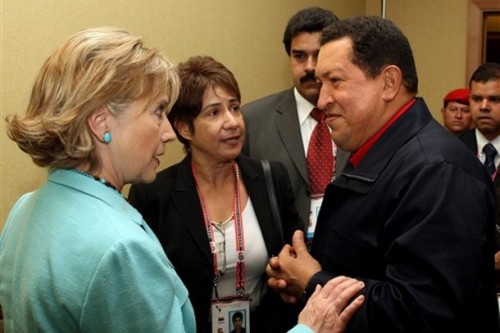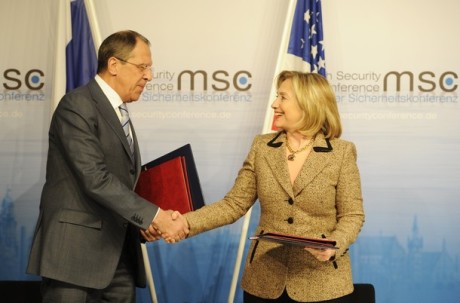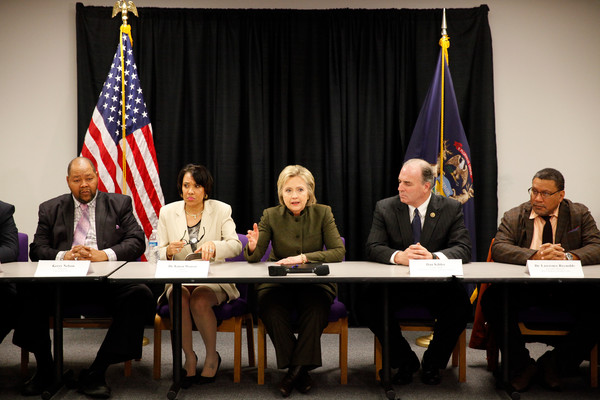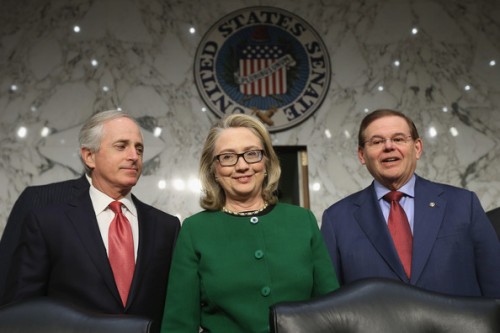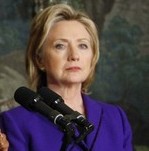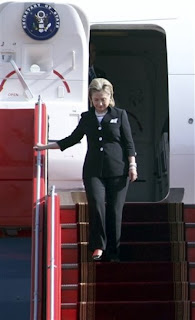The infinitely patient Ms. Marie Harf remounted the bucking email bronco today in the State Department press room. To her credit, she managed not to get thrown and will be signing up for riding lessons, so to speak. She is going to take an “FOIA class.”
Longtime readers here know that the raw story, with the actual words and exchanges when available, is the preferred medium for posts on this site as opposed to third party interpretations.
Marie Harf
Washington, DC
QUESTION: All right. And can we get some more clarity on what exactly the Department is doing as part of its review into former Secretary of State Hillary Clinton’s emails?
MS. HARF: Yes. We are doing a review of her emails for public release, as she asked us to do on Wednesday evening in the tweet I’m sure you all have now seen. We will use FOIA standards for the review. So the standards by which we process FOIA requests, we process documents to be released, those are the standards we will use for the review.
The initial press report that we’re doing an investigation of her emails for security reasons was not correct. It has since been changed to reflect that. Again, we will start that review for public release and work as quickly as we possibly can.
QUESTION: So will you be looking into whether any sensitive but unclassified – I mean, if you come across sensitive but unclassified material that was sent over a non-official email account, what will you do? Will you not report it? Will you report it? Will you —
MS. HARF: Well, I’m not going to speculate on what might happen in that situation. I’m not going to prejudge the outcome of the review for release of the 55,000 pages. Again, that will start soon and we’ll work as quickly as we can.
QUESTION: So yesterday a senior official said something similar about prejudging, but it implied that you’re not going to talk about whether she breached a provision because you don’t want to prejudge the outcome of the review. That would —
MS. HARF: Well, we just don’t know what’s in the emails yet.
QUESTION: But that would imply that your review would look into whether she did that or not, no?
MS. HARF: Well, no – well, no. Both things aren’t necessarily true. The review is for purposes of public release. So if someone sent in a FOIA request, if – I’m sure all of you have done this – there’s a process by which we review documents for public release. That looks, for example, at whether there’s things like personally identifying information that is not released under FOIA – social security numbers, for example; that’s just one example. Obviously, I’m not going to prejudge what might happen as a result of looking through these 55,000 emails to release them publicly. That is the purpose of the review. Those are the standards by which the review will be done.
QUESTION: But what is the normal protocol then if someone breaches the provision that you shouldn’t send sensitive but unclassified information via personal email?
MS. HARF: Well, again, the Foreign Affairs Manual, which I think you’re referring to, contains policies and procedures that provide guidance to Department employees. That is quite separate from the federal regulations. Those are just two different things, and I am just not going to speculate on – on those kinds of hypotheticals.
QUESTION: But you see how that’s problematic. You’re saying there is a possibility that if you come across this, nothing will happen, nothing will be said.
MS. HARF: I did not say that. I said I’m not going to speculate on what might happen.
QUESTION: But why aren’t there —
MS. HARF: I am not ruling anything out.
QUESTION: Why aren’t there policies in place for how to deal with this? It just seems like a pretty simple thing.
MS. HARF: Well, I think nothing about this issue is simple, as we’ve all learned in the past four days, and I’m not going to speculate on what would happen throughout the course of this process if that is, in fact, found. I’m just not going to speculate on that.
QUESTION: So there are no rules in place for potential breaches of this FAM provision?
MS. HARF: I can check and see. I haven’t seen any myself, Brad —
QUESTION: Okay.
MS. HARF: — but I can check and see.
Yes, Justin.
QUESTION: Marie —
MS. HARF: We’ll just go across the front row here.
QUESTION: Thanks. The other day you said you’d check to see what policies were in place while Clinton was in office that might forbid her from using a private email account. Have you had a check – a chance to review that policy?
MS. HARF: Well, no, as I said, there was nothing in place at the time that prohibited her from using a personal email account for official business as long as the records were eventually preserved. I said that three days ago.
QUESTION: Right. But as you are aware, there have been now IG reports and cables that have surfaced that state clearly in one case that State Department officials should, quote, “avoid conducting official department business from personal email accounts.”
MS. HARF: Well, let’s – let me talk through some of that.
QUESTION: And Scott Gration appears to have been reprimanded for using personal email.
MS. HARF: Let’s talk through that.
QUESTION: Yeah.
MS. HARF: So let’s talk through those issues because they’re a little bit different and I think you’re oversimplifying it. So let’s talk through them.
When it comes to former Ambassador Gration, he resigned his position, contrary to some press reports. The IG report I believe you’re citing also refers to that same FAM. We’re all talking about the same provision in the Foreign Affairs Manual which deals specifically with sensitive but unclassified information, not – it was not a general – not a general policy or guidance about email use in general. It refers to one specific kind of email use: sensitive but unclassified. That is the same FAM that is referenced in the cable. It is the same FAM that’s referenced in the IG report.
Yes, Lesley.
QUESTION: Yeah, I was going to ask a follow-up to the same question. I mean, is there anything here from the outset that she broke any rules as far as using her personal email?
MS. HARF: Well, again, I am not going to prejudge what’s in these given that we haven’t looked through them yet. The Foreign Affairs Manual is guidance or policies for State Department employees. It is not a federal regulation. It is different than that. And again, the FAM that we are all talking about, I think, refers specifically to one kind of information and personal email use, not to personal email use in general. As we’ve always said, it is permitted, but given that things need to be preserved.
QUESTION: I think the cable itself does not refer to that one specific FAM.
MS. HARF: It does. I’m looking at the cable right here, Reference A, 12 FAM 544.3.
QUESTION: Which refers to Letter F of that – sorry to get really arcane.
MS. HARF: No, I have the FAM in front of me too.
QUESTION: But that’s just an index of the referenced FAMs, and that has nothing to do with the other subpoints of the text.
MS. HARF: No, no. So let’s – two points – three points on the cable.
First, the cable references the FAM that deals with sensitive but unclassified information as – that is the FAM that deals with SBU information. I have it in front of me. I can —
QUESTION: Right. Referring to auto-forwarding, which is not what we’re talking about.
MS. HARF: No, no, no, no, no.
QUESTION: Why don’t you read it? Why don’t you read it?
MS. HARF: FAM – okay. Our Ohio State visitors, this is not usually what happens. (Laughter.)
FAM 544 – 12 FAM 544, starting with point one, point two, point three, that all refers specifically to sensitive but unclassified information. So that FAM deals with one kind of information, not with personal email use in general.
But more broadly speaking on the cable, this is – this cable is a guidance on best practices. It’s certainly not regulations. It was more couched – and if you look at it – what can you and your family members do? It’s more —
QUESTION: Regardless of whether it’s sensitive —
MS. HARF: Wait, can I finish and then you can follow up? No, no, let me finish and then you and follow up. It’s helpful tips for people when they’re talking about this issue, again referencing a FAM that deals entirely with SBU information.
QUESTION: So you’re saying that when it says to – “Beware emails with fake password links,” that’s only about sensitive but unclassified information?
MS. HARF: No, I’m saying two things —
QUESTION: When it says, “Create —
MS. HARF: Mm-hmm.
QUESTION: — “Create strong passwords,” that’s about sensitive but unclassified —
MS. HARF: Again, isn’t that – that’s guidance, Brad.
QUESTION: When it says, “Do not reveal your personal email address,” that’s only about sensitive but unclassified?
MS. HARF: No, I’m not – that’s not what I was saying.
QUESTION: This is general guidance, correct?
MS. HARF: I said – well, two things. Look, two things are true here. I think you’re saying that one of them has to be and the other can’t be.
QUESTION: No, I think it’s both.
MS. HARF: Two things are true here – one, that the only reference listed in this cable is the one we’re all talking about that refers to SBU information. But this cable in general is talking about – is guidance on best practices, colloquial guidance for people when it came to personal email. It also uses words like “encouraged to check,” “in general, avoid doing this.” So this is certainly not a regulation or a policy.
QUESTION: That’s fine, but has —
MS. HARF: But I think that context is important.
QUESTION: If it’s general guidance, do you accept the notion that the secretary, the former secretary, didn’t follow her own guidance on best practices?
MS. HARF: I don’t. I think that’s a oversimplification of what’s going on here. I understand there’s a cable that in general is – has some guidance and best practices in it, but I think drawing that conclusion is going a step too far.
QUESTION: If she had followed everything in here, would you have said that she had followed her best practice guidance?
MS. HARF: This isn’t her best practice —
QUESTION: Or would that be an oversimplification as well?
MS. HARF: Also, this isn’t her best practice guidance. Her name is at the bottom of the cable, as is practice for cables coming from Washington.
QUESTION: It was —
MS. HARF: Some people think she wrote it —
QUESTION: Right.
MS. HARF: — which is not accurate.
QUESTION: We know that, but —
MS. HARF: Well, not everyone knows that.
QUESTION: — it was her department, so —
MS. HARF: That is true.
QUESTION: — regardless of whether she wrote this herself or punched it into the keyboard herself or —
MS. HARF: Or some – right.
QUESTION: — her personal account herself, this was her department.
MS. HARF: But I feel the need to correct some misinformation.
QUESTION: Well, just to follow up —
MS. HARF: Yeah.
QUESTION: — because I was going to follow up on my question earlier, was Secretary Clinton at the time discouraged from using her own email given the knowledge that you had that this could cause issues?
MS. HARF: I just don’t have details on that.
QUESTION: On that kind of thing —
MS. HARF: I just don’t have details on that.
QUESTION: And you’re not suggesting that she wasn’t sensitive but unclassified information from her —
MS. HARF: I’m saying that we don’t know; we haven’t gone through the emails yet.
QUESTION: Well, I mean, she’s – she was the secretary of state. How could any reasonable —
MS. HARF: So you’re happy to assume what’s in those even though you haven’t seen them, Tristan?
QUESTION: I think it’s a fair assumption – 55,000 emails and she didn’t —
MS. HARF: Okay. Well, let’s talk after we go through them, and then we can have that conversation.
Indira, let’s move on.
QUESTION: So, Marie, on the same cable, a couple things. First of all, would you be willing to release that cable for us so that we could all see is?
MS. HARF: I think everyone can read it at foxnews.com if they’d like to. (Laughter.)
QUESTION: Okay. And then specifically it refers in the text of it that we’ve seen —
QUESTION: Is that an endorsement? (Laughter.)
MS. HARF: That was in no way an endorsement. (Laughter.) (Inaudible.)
QUESTION: I didn’t know whether any of it was missing. I didn’t know whether any of it was missing or whether it’s complete.
MS. HARF: I actually —
QUESTION: I mean, I don’t know if it’s a complete account.
MS. HARF: Let me check.
QUESTION: But what —
MS. HARF: I don’t mean to be flip about it. Let me check.
QUESTION: What we’ve seen is that it refers to the risks of using personal email in light of Google’s Gmail hacking problems. And so that seems like that hacking problem would apply to anything, not just sensitive but unclassified information.
MS. HARF: Again, this is general guidance about personal email use. So I don’t have much more for you than that on this cable from 2011.
QUESTION: Okay. And then can you explain to us what – was there a particular issue that caused that to be issued other than the Google hacking issue? And then also in 2013 and 2014, was there some incident that precipitated the rules being strengthened, the regulations that we’ve talked about being strengthened?
MS. HARF: You’d have to check with NARA on that given – I think you’re referring to the NARA regulations from 2013 and 2014?
QUESTION: Mm-hmm.
MS. HARF: I mean, you’d have to check with them. Not to my knowledge —
QUESTION: Nothing at State happened that caused you to strengthen those regulations?
MS. HARF: I have no idea. I’m happy to check.
QUESTION: Okay. Okay.
MS. HARF: This is – but to be fair, the – and those regulations I think you’re talking about in 2013, 2014, were about preservation, not about security. So that’s —
QUESTION: That’s right. It’s a separate thing.
MS. HARF: It’s a separate thing.
QUESTION: Yeah.
MS. HARF: And again, what we’ve talked about in this room is that the rules have been unclear when it came to preservation for some time. And I know NARA is constantly trying to update them to sort of keep pace with just the amount and sheer volume of email, for example, we use, and to keep up to speed on that. I – this cable, having read a lot of cables, looks fairly ordinary to me and doesn’t look particularly like it was prompted by anything. Not knowing the backstory, this sort of looks like, again, some helpful tips when you’re using personal email.
QUESTION: Okay. And then back to the question of security, since the State Department was aware from the start that Secretary Clinton was using her personal email, can you tell us, or if you don’t know, find out for us, State Department security internet folks you would think would either have gone to her house to look at her server or would have gone over with her passwords, what devices was she going to use this on. We had that whole thing about President Obama wanting to use a Blackberry. So the security of high-level U.S. officials using devices – on what devices was she going to use it. Can you please lay out for us what steps were taken to check that?
MS. HARF: I just don’t have any details for you on that. I know there are a lot of questions about that. As we get information —
QUESTION: Will you look into it?
MS. HARF: — we can share, we will. But I know there are a lot of questions in general about this, and as we get information we can share – I just don’t have anything for you on that.
QUESTION: Okay. Then, so specifically, if someone – if you could find out for us, take the question of did someone go to her house and look at her —
MS. HARF: Indira, this question has been asked for three days now, and I am happy to keep seeing what information we can share. I don’t have any information for you at this – on this – about that at this time.
Margaret.
QUESTION: So have you sought that information, just as —
MS. HARF: I always try to get answers to your questions.
QUESTION: No, not you. Has the Department sought that information from —
MS. HARF: From inside the Department?
QUESTION: From former Secretary Clinton. Questions on what her server was, did it have encryption – have these questions been asked of the former secretary?
MS. HARF: I’m just not going to have details on that for you.
Yes, Margaret.
QUESTION: Marie – I mean, along those lines of – was there a carve-out for Secretary Clinton at the time? I mean, if the State Department was —
MS. HARF: What do you mean, a carve-out?
QUESTION: Well, if the State Department was aware that she was using personal email for work purposes, did the State Department’s lawyers bless that? I mean, if this was all kosher, it sort of changes the entire conversation if the State Department lawyers said it was fine.
MS. HARF: Well, I don’t have details to answer that question either for you. We know what the federal regulations were at the time and are now – I just don’t have much more for you – beyond that for you.
QUESTION: But was – when she came to office – I mean, I think generally when a secretary comes in, her chief of staff or somebody on her staff would’ve been briefed on what those regulations are.
MS. HARF: Mm-hmm, that’s certainly the case.
QUESTION: Did that happen in her case?
MS. HARF: I can check and see if there are details on that to share.
QUESTION: Well, I mean – and if you would, and if you would find out if there were any differences. I mean, she was an extraordinary person coming into this, a very different profile than other secretaries. I mean, were there special standards for her that there weren’t for previous secretaries given not only the changes in the technology, but she herself? I mean, if the White House had signed off on this, it would’ve been a different conversation today.
MS. HARF: I can check and see if there’s more to share for you on how those decisions were made at the time.
Any – what else on this? Elliot?
QUESTION: (Inaudible) different topic.
MS. HARF: Anything else on this?
QUESTION: No, same topic.
MS. HARF: Yes, Josh.
QUESTION: I want to just follow up on our discussion Tuesday and I guess Wednesday on the genesis of the October 2014 letter to the former secretaries.
MS. HARF: Mm-hmm. Yep.
QUESTION: First, can you tell us who sent the letter?
MS. HARF: Who specifically signed it at the State Department?
QUESTION: Yeah. Right.
MS. HARF: I can check. I’m sorry, I do not know that. I can check.
QUESTION: Okay. And can you tell us anything more about how it began? Because there’ve now been press reports that the concern about this issue arose out of the Benghazi select committee’s investigation sometime during the August timeframe, and I’m just curious whether that had played any role whatsoever in the Department’s decision to take this pretty unusual step of approaching former secretaries.
MS. HARF: I wouldn’t call it unusual, and what I would say is I think there are also Administration sources in those press reports saying it would be grossly simplistic to say that any one thing prompted us to send this letter. As I noted, I think to you the other day in the briefing, this predated the request from the select committee just from a time perspective —
QUESTION: All their requests?
MS. HARF: I’m sorry?
QUESTION: All their requests to the Department?
MS. HARF: I can check on that. But the request that was pertinent, I think, to her email was later; that’s my understanding. It came a month later, I think.
But a couple points: This actually isn’t that unusual. We are – we have been struggling in trying to figure out how to preserve all the records given the use of email now that wasn’t even that way five years ago. And so we have had an ongoing process, as NARA has had too, to update regulations, clarify policies, make sure we have the records we need. So that was part of that process. And again, it came before the request. So I would – it would be incorrect to say that any one issue prompted this letter.
Of course, we have worked closely with the select committee and with Congress on this, have been transparent and provided as much as we can in response to their requests, so certainly, that’s a factor. But I would not say – as we’ve said now a few times, it was not any one thing that prompted this.
And we really have been – I know it’s not always in the news until now, but there has been a process of trying to update our records. NARA has actually done a lot of work to clarify what the responsibilities are of senior officials in terms of preservation, and that is an ongoing process.
QUESTION: Can you tell us – one of the press reports also said that Secretary Kerry played some role in the discussion about this email situation. Do you know if he’s played any role in that?
MS. HARF: The – about what part of it? I haven’t talked about it with Secretary Kerry.
QUESTION: In making a decision to go to the former secretaries. I mean, it does still strike me as somewhat unusual that lower-level officials in the Department would take the step of going to retired former secretaries and ask them to return records to the Department.
MS. HARF: Well, I wouldn’t say – first, I don’t know who signed it. I mean, some of those – I’m not sure the press reports referenced the Secretary. I think they talked about his staff —
QUESTION: Okay.
MS. HARF: — his senior staff, including his chief of staff – well, former chief of staff as of today, if everyone saw the news about Jon Finer. I think it’s appropriate that if – as we as a Department are trying to work through how to update the records of senior officials, including secretaries, the Secretary’s staff would be the one involved in those conversations. There’s – I don’t think there’s anything unusual about that.
QUESTION: Okay. And two other quick things on this.
MS. HARF: Uh-huh.
QUESTION: Is the inspector general at this point, as far as you know, conducting any review of how this email matter was handled?
MS. HARF: I haven’t heard that. You know the inspector general is independent, but – so I think you could check with them, but —
QUESTION: Okay.
MS. HARF: — not that I’ve heard, but I’m not sure I would have.
QUESTION: And at the very outset, you mentioned the FOIA review process. Among the various things they look for, is one of the things they look for in documents prior to release classified information?
MS. HARF: I’m sorry?
QUESTION: In the FOIA review process —
MS. HARF: Okay.
QUESTION: — among the various things that they look for – you mentioned PII, Social Security numbers —
MS. HARF: Yeah, yeah.
QUESTION: — SBU. Is one of the things they look for in that process, even in records that don’t bear classification markings, sensitive national security information?
MS. HARF: That – well, sensitive national security information is different than classified information.
QUESTION: Well, let’s say classified information.
MS. HARF: So which are you asking about?
QUESTION: Classified information.
MS. HARF: I can check. I don’t have all the FOIA regulations in front of me. I would also remind people that SBU is not a national security classification. It’s just not. But I can check on that and see if there’s more of a list of what FOIA looks at.
QUESTION: And as a follow-up on the FOIA —
MS. HARF: Yeah.
QUESTION: By the way, you said it was Jon Finer leading it. It’s not Jon Finer.
MS. HARF: No, I said if everyone saw the news about Jon Finer. He’s the new chief of staff.
QUESTION: Oh, yes.
MS. HARF: Yes.
QUESTION: A follow-up to —
QUESTION: (Inaudible.)
MS. HARF: David Wade is leaving. No, no, no. Jon Finer didn’t leave on day one. (Laughter.) He’s just staying in London. (Laughter.) No, Jon Finer is our new chief of staff.
QUESTION: Hardships.
MS. HARF: Yes, yes, yes, yes.
QUESTION: On the FOIA standards you mentioned —
MS. HARF: Yes.
QUESTION: So does that mean the FOIA office will be conducting this review?
MS. HARF: I don’t have more details on that. I know it’s a good question. There’s a lot of process questions. It’s a huge batch, as we’ve talked about. So as we have more to share on the process, I will. I just don’t have it today.
QUESTION: So it hasn’t started – the process – by any means —
MS. HARF: I don’t —
QUESTION: — if we don’t know who’s actually doing it?
MS. HARF: Let me check. Let me check.
QUESTION: Okay.
MS. HARF: Let me check.
QUESTION: On the emails?
MS. HARF: Yes.
QUESTION: Which other former secretaries have submitted their emails? Or have all of them submitted their emails?
MS. HARF: So we sent the letter out a few months ago. No other secretaries have yet responded. I understand Secretary Powell’s office may have said they are going back and looking to see if they have anything. It’s my understanding no other secretaries have responded.
And I would say – and I know there’s a lot of questions about transparency, but it is – I mean, what we are doing now going forward – and there’s lots of questions about the past, and I get that – she has asked us to look at all 55,000 pages and determine what is appropriate for release. So that process is going to happen. And what we determine is appropriate under those FOIA standards will be public, which I think is actually a pretty extraordinary thing.
QUESTION: So why haven’t other former secretaries responded and submitted their emails?
MS. HARF: I think you’d have to ask them. I don’t speak for them.
QUESTION: But we’re only talking – we’re talking about two other secretaries, right?
MS. HARF: So we sent —
QUESTION: I mean, Henry Kissinger wasn’t asked —
MS. HARF: No, the furthest back —
QUESTION: — to provide his 1970 —
MS. HARF: — we went was Secretary Albright.
QUESTION: Okay.
MS. HARF: So Secretary Albright, Secretary Powell, Secretary Rice, and Secretary Clinton.
QUESTION: So you don’t expect to withhold any of the 55,000 due to classification —
MS. HARF: I’m not going to prejudge —
QUESTION: — sensitive classification —
MS. HARF: I’m not going to prejudge the outcome of a review.
QUESTION: They should all be —
QUESTION: As part of this review, are the emails that her staff had on the personal server going to be reviewed as well? And if not, why not?
MS. HARF: Well, this is a review of her emails and her records.
QUESTION: But they were working for her, they were State Department employees, they were ostensibly working —
MS. HARF: But that’s a different thing.
QUESTION: But if they’re working on her behalf, if they’re helping to represent her opinions, her views to the rest of the Department, why wouldn’t their emails be looked at as well?
MS. HARF: Well, I understand the question, but we’re talking about a batch of emails in response to a request from the State Department to update our secretary of state records. So we have hers, and that’s the review that we’re doing right now.
QUESTION: But the employees are – also have an obligation —
MS. HARF: I understand that.
QUESTION: — to provide and to make certain that those —
MS. HARF: I understand that.
QUESTION: — records, which are public documents, are made available. Why not just bring them all in right now and look at everything —
MS. HARF: Because you’re talking about —
QUESTION: — as opposed to a drip, drip, drip?
MS. HARF: Well, this –55,000 pages is not a drip, drip, drip, Roz. That’s a pretty big stack of paper. But I would also say this was a request for former secretaries. We can talk about separate issues about her staff, who had – who did have state.gov accounts and who were responsible for preserving that, their records there. So that’s just a separate issue, and I just don’t have anything for you on that today.
QUESTION: Will any attempt be made to check whether these are all the emails, or will you just be accepting the secretary’s word on this?
MS. HARF: Well, as we have said, her staff has said these were all the responsive emails they had to our request, and that’s really a question for her staff to answer.
QUESTION: Well, no, no. My question is: Will the State Department be attempting in any way to verify whether they are all the emails? I mean, what I imagine is there are various methods you can use to look at whether they’re in sequence or whether there are gaps. I mean, will there be any attempt to verify this?
MS. HARF: Well, a couple points. First, as I’ve said, it covers the breadth of her time at the State Department. So it covers the span of when she was here. But —
QUESTION: The request does, but —
MS. HARF: No, the records in response cover – the emails she gave us back cover the breadth of her time at the State Department.
QUESTION: How do you know that? How do you know they’re all —
MS. HARF: Because I know when she started and when she left, and they correspond to that and they cover all of the time in between. Second —
QUESTION: But she —
QUESTION: But you don’t know that there’s gaps or deleted emails or some that just weren’t sent –
MS. HARF: Well, of course, but like – there’s not, like, two months missing, right? That’s – right.
QUESTION: But you don’t – you can’t say for sure – his point is that every email and —
MS. HARF: Correct.
QUESTION: — some critics or —
MS. HARF: Correct. But I would —
QUESTION: — whatever you want to call them have picked up on this, that you can’t know that —
MS. HARF: Correct.
QUESTION: — you have every email unless —
MS. HARF: And I’ve said that.
QUESTION: — you see the server.
MS. HARF: Well, I’ve said that, obviously, her staff has said that. But I would make a second point, though, is that each individual employee has a responsibility under the federal regulations to preserve their own records with a State Department account or a personal account. When you walk out the door, it is your responsibility to provide those. Does that make sense? Regardless of what kind of account it is.
QUESTION: When you walk out?
QUESTION: Well, yeah, but there’s a difference because —
QUESTION: Right, but there’s no way to check it that makes —
MS. HARF: But there was no time – right, right.
QUESTION: There’s a difference —
MS. HARF: That was colloquial, Josh.
QUESTION: — because in a FOIA request —
MS. HARF: But thank you for fact-checking me live and instantaneously during my press briefings.
QUESTION: In a FOIA request —
MS. HARF: You should come more often, I like it. What?
QUESTION: — or a congressional subpoena, then the State Department would have the ability to look through its server to see if everything has been sent. In this case —
MS. HARF: But that’s not —
QUESTION: — you don’t have access to that server, so there’s —
MS. HARF: That’s not the process of how it works, even with state.gov emails, Brad, generally speaking.
QUESTION: You’re saying that the State Department – for all FOIA requests, it relies on the goodwill of the individuals?
MS. HARF: I am not saying that for all – anything. I’m not making a general statement about FOIA, and I’m also saying it’s not about goodwill. What I am saying is, in general, each employee is responsible for being responsive to records requests, document requests. I’m not going to get into “always,” but —
QUESTION: That sounds like goodwill if it’s up to the employee himself to do it.
MS. HARF: No, it’s not goodwill, it’s a responsibility.
QUESTION: That’s the same thing.
MS. HARF: I don’t think that’s the same thing.
QUESTION: It’s not – there’s no independent mechanism separate from that employee.
MS. HARF: Well, then maybe you have a problem with the FOIA process.
QUESTION: No, I’m asking – I don’t think you’re right, actually, but —
MS. HARF: I would bet you 100 bucks I’m right.
QUESTION: All right, I’ll take it on. (Laughter.)
QUESTION: I have a few more.
MS. HARF: No, but my point – look, my point is that like I understand your question, the crux of your question; I do. I cannot stand up here and say – that’s a question for her staff to answer. They have answered it. They can speak to that.
QUESTION: No, my question wasn’t have they been provided. My question was: Is the Department going to take any steps to verify they will be provided? That’s a different question.
MS. HARF: And I just don’t have – okay. I just don’t have any more details for you on that. I understand the question, I understand why you’re asking it, but I just don’t have more details for you than that.
QUESTION: So when the purpose is to preserve these emails as a history, so why you’re not asking for all the emails?
MS. HARF: We asked for all of her records that she had that were federal records, so we did. We asked for all of them.
QUESTION: But her office is saying they have not provided all the emails, right?
MS. HARF: Her office said that yes – no, that’s not correct, actually.
QUESTION: So then why didn’t – you haven’t asked them —
MS. HARF: Her office said – and I’m not the spokesperson for her office. People may have been confused about that this week. But what her office said is she provided everything that met that criteria.
QUESTION: But that criteria, would it be decided by the State Department, rather than her office?
MS. HARF: Well, there is criteria that NARA lays out about what is a federal record. It’s anything related to official business. So I think as her people have said, it wasn’t spreadsheets for her daughter’s wedding, but it was anything related to official business.
QUESTION: But wouldn’t people, people, Americans several decades after this would like to know what the secretary of state did at that time of her —
MS. HARF: Well, I think that’s why she’s asked us to review all 55,000 for public release —
QUESTION: I have one more question.
MS. HARF: — which I can’t think of any other public official asking anyone to do, actually.
QUESTION: So when other former secretary of states submit their emails, would that be sort of the same kind of review which you are doing right now?
MS. HARF: For public release? I don’t know, who knows. This resulted because she asked us to do this.
QUESTION: One for public release, one if there were any breach of State Department regulations?
MS. HARF: Well, I didn’t say we were looking at her emails for that purpose; I said we are not.
QUESTION: She asked you to do it, but she wouldn’t have been in compliance with the law had she not asked you to do it, correct?
MS. HARF: No. The law says nothing about releasing them publicly. The federal regulation —
QUESTION: But turning them over.
MS. HARF: Turning them over, that’s different.
QUESTION: Yes. Yeah, okay.
MS. HARF: That’s different. Still on this?
QUESTION: Marie —
QUESTION: I have one more.
MS. HARF: I think we have like eight more, but —
QUESTION: (Inaudible.)
MS. HARF: Oh, hello.
QUESTION: Hi, there.
MS. HARF: Wait, we have a special guest in the briefing room today. Go ahead —
QUESTION: Oh, yes.
MS. HARF: — playing the role of Elise Labott.
QUESTION: Not – I am, poorly. Not to ask you to prejudge this specific case with Secretary Clinton, but just the process of a review, wouldn’t it be incumbent on the State Department to reveal if they found any sensitive but unclassified documentation, information in emails that were reviewed?
MS. HARF: I know I’m going to go back to the same line again, but I’m not going to prejudge what might happen —
QUESTION: But I’m not asking you to prejudge her case.
MS. HARF: Or what would happen, though.
QUESTION: I’m talking about a policy on the general review process. It seems very reasonable to assume that in the course of it, if SBU was discovered that it would have to be —
MS. HARF: That that would be made public?
QUESTION: That it would be somehow dealt with, right?
MS. HARF: Again – and this was to Brad’s question – I’m happy to go back to our lawyers and see if there’s more on this about what might happen if something is discovered, but again, I don’t want to speculate on that, and we just don’t know what would happen in that situation. There are so many variables and factors, I really just don’t want to speculate.
QUESTION: Well, I have (inaudible) —
QUESTION: How did the agreement come to be?
MS. HARF: Which agreement?
QUESTION: Discussing the review, Secretary Clinton tweeted that she has asked the State Department to release these emails. Obviously, I imagine on her side that may be her aides, that’s her, that’s her lawyers. Who at State is sort of brokering the terms of this with her?
MS. HARF: Well, there aren’t terms – I mean, the terms – I’m not exactly sure what you mean by terms. There was —
QUESTION: Who’s interacting, who’s interfacing with Clinton and her team on this?
MS. HARF: There’s senior officials here; I’m probably not going to go into more details. I can check and see if we can. But senior officials here, obviously, have talked to her team throughout this process, whether it’s just an open line of communication to make sure – from a legal perspective, to make sure we’re getting what we need, or conversations with the secretary’s staff when they said – okay, we’re – when they came to us and said we’re going to ask you to review them for release, we agreed that was a conversation between senior aides here and senior aides to her.
QUESTION: You said on Wednesday you were asked about whether the cyber security office here at State had concerns. Have you gotten an answer on that?
MS. HARF: I don’t have more details for you on that.
QUESTION: Have you checked on that?
MS. HARF: I’m checking on all of this, I promise, but I just don’t have more details to share about that.
QUESTION: So – but what’s the reasoning for not being able to share that information?
MS. HARF: I just don’t have details on that to share.
QUESTION: Is it someone not providing it, or is it sensitive, or —
MS. HARF: I know there are a lot of questions about this and other issues. As we get definitive answers that I can share, I am happy to, but there are going to be questions like that that we may not be able to share information on.
QUESTION: Can I ask —
MS. HARF: I will attempt to share as much as I can.
QUESTION: Can I ask a follow-up on the sensitive but unclassified?
MS. HARF: Uh-huh, yes.
QUESTION: Two days ago, you said that it would take months to review this process because —
MS. HARF: It’s expected to take several months.
QUESTION: — you would have to scrub any sensitive but unclassified information.
MS. HARF: That’s not what I said.
QUESTION: You would have to – you mentioned, I think —
MS. HARF: Personal identifying information.
QUESTION: — personal – which is sensitive but unclassified.
MS. HARF: Not necessarily.
QUESTION: If it’s a Social Security number, if it’s a home address, if it’s —
MS. HARF: It’s not – no, not necessarily. PII is not always SBU. We’re going to get into really Wiki stuff on this, guys. I’m ready.
QUESTION: So if – so – whoa, whoa. You would scrub sensitive but unclassified information as part of this —
MS. HARF: I didn’t say that. We can take —
QUESTION: Whoa, whoa, whoa. You’re going to publish people’s Social Security numbers?
MS. HARF: I also didn’t say – I didn’t say Social Security numbers are SBU. Those are PII. It’s a different term, different thing. No, don’t roll your eyes at it, Brad. There’s – if you go into my email and I have to put a portion marking at the bottom, those are two separate portion markings.
QUESTION: Look —
MS. HARF: What I am going to commit to you is to see if there are more detailed FOIA standards that they – that we do these reviews under that we can share. There may not be, but I think that might be helpful to folks as you say, “What are you looking for in her emails”.
QUESTION: So general practice is you take out sensitive but unclassified information. Is that not correct?
MS. HARF: I don’t know. Let me check on that. Let me check.
QUESTION: But here’s the deal: You’re talking about scrubbing some information potentially, correct?
MS. HARF: Using the FOIA standards that would have been used if we had the emails at the time.
QUESTION: Using the FOIA standards. So —
MS. HARF: The same standards that would have been used no matter when we got the emails.
QUESTION: If you put out these documents in however many months or years or whatever, and you say this is the breadth of the information and you don’t say what has been scrubbed, there’s a problem with that —
MS. HARF: Well, why would we say what has been scrubbed if it was scrubbed for a legitimate reason?
QUESTION: What category?
MS. HARF: What – you want us when we release them to say what category?
QUESTION: You generally do. You pick the reason —
MS. HARF: Okay, I’ll let our team who’s doing the review know that —
QUESTION: No, listen, listen, listen.
MS. HARF: — and we’ll take that under consideration.
QUESTION: So to say – but to say today that you won’t say whether or not there’s any sensitive but unclassified info —
MS. HARF: I did not say that, Brad. I said I’m not going to prejudge the outcome of this review. What we will —
QUESTION: I think I just said the same thing. You won’t say whether or not you will do this.
MS. HARF: Right. I’m not going to say what we’re going to do in any way at the end of this.
QUESTION: But usually you have to explain your redactions. So if you do take something out, you would have to say why you took it out —
MS. HARF: I said —
QUESTION: — what type of information it is.
MS. HARF: I said we will use the FOIA standards. I can go see – Brad, look, I’ve never submitted a FOIA request. I don’t know what letter you get back and what it says about the documents. I’m sure many of you have and can speak to that. I am happy to go back to the FOIA office and see if there’s more to share about this process in general. But I’m not going to stand up here and say at the end of this process this is what we’re going to do. How would I know that? We haven’t even done the process yet. That seems wholly speculative, hypothetical, and not instructive.
QUESTION: It doesn’t – if you’re saying you’re applying the FOIA standards, usually there’s rules guiding what you take out and what you disclose about that.
MS. HARF: And I said I will check with the FOIA office to see what those are. I’m not just going to take your word for it.
QUESTION: It’s not a prejudge —
QUESTION: Marie, given that —
MS. HARF: Yes.
QUESTION: — Secretary – former Secretary Clinton is a presidential hopeful in 2016 —
MS. HARF: I will let you do that analysis.
QUESTION: Well, that’s what pundits are saying —
MS. HARF: One great part about this job is I worry about elections overseas, not at home.
QUESTION: They would probably not be this focused if it wasn’t the case. So —
MS. HARF: Do you think so, really?
QUESTION: Number two, does this Department feel under pressure in any way to be going through those emails and scrubbing, as Brad calls, sensitive – that would not ruin those – so is there any pressure that this Department is under?
MS. HARF: That’s why I wanted to say very clearly today that we’re going to use the FOIA standards, the same standards we would have used regardless of when we got these emails, regardless of who the official is. And there are career experts who do this; that’s what’s going to guide this process. I want to be very clear about that.
QUESTION: But if there are correspondence between secretary of state and her foreign counterparts, would you be consulting your foreign counterparts, foreign countries before releasing these emails?
MS. HARF: I don’t have anything to prejudge about how this review might unfold.
QUESTION: Does that include (inaudible) under the FOIA guidelines?
MS. HARF: I just said I will check on the FOIA guidelines. I’m going to go take a whole class on FOIA after this.
QUESTION: So Marie —
MS. HARF: Yes, Roz.
QUESTION: — to be very explicit to Lesley’s point, is this Department feeling any political pressure from the White House, from the Clinton camp, from any Clinton supporters to review and to remove information that could potentially be embarrassing to a possible Clinton campaign?
MS. HARF: No. No.
QUESTION: Just quick follow before I go to a new subject.
MS. HARF: Margaret’s trying desperately here, which I appreciate.
QUESTION: Just quick follow before I go to new subject.
MS. HARF: Yes.
QUESTION: As far as these emails are concerned, madam, these were on personal accounts by, you said —
MS. HARF: Account, one account (inaudible).
QUESTION: Right – several secretaries, of course, in the past also.
MS. HARF: Correct, yes.
QUESTION: So that means they were talking sensitive issues with foreign governments?
MS. HARF: I don’t know what’s in their emails. I haven’t seen them.
QUESTION: So you think they will also leak by the WikiLeaks and other leaks, part of that?
MS. HARF: I have no idea how you’re trying to bring these things all together and relate them to each other, but I don’t have much more for you than I think I’ve already said.
QUESTION: Let’s do a different topic.
QUESTION: Can we change —
MS. HARF: We can change the subject.
QUESTION: Can we go to South Korea? Do you have an update —
MS. HARF: We can, yes.
QUESTION: — on the current status —
MS. HARF: I would just like to point out that this is a very important story that I’m surprised it took us so long to get to. Yes, go ahead.
Read more >>>>






